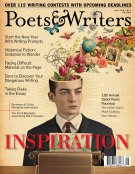Sir Patrick Hill. Emily Nicholson. Katie Trump. These are just a few of the names created using the tongue-in-cheek #WhitePenName Generator, a website launched by the Asian American Writers’ Workshop (AAWW) last fall. The generator, meant to spotlight the advantages that come with a Caucasian-sounding name, was born in the wake of September’s literary scandal surrounding white poet Michael Derrick Hudson, who, after having a poem rejected by forty journals, adopted the Chinese pseudonym Yi-Fen Chou in an attempt to have a better shot at publication. He revealed himself after landing a coveted spot under the pseudonym in The Best American Poetry 2015.
The outcry that followed created an opportunity for conversation about racial inequality in publishing, says AAWW executive director Ken Chen. Celebrating its twenty-fifth anniversary this year, the AAWW is at the front lines of that very conversation. A self-described arts space “devoted to literature at the intersection of race, migration, and social justice,” the New York City–based organization is committed to advancing the creation and publication of Asian American writing. It’s at once an incubator for emerging writers, a community center, an advocacy group, and a publisher.
The case of Michael Derrick Hudson highlights the long-standing imbalances that Asian American writers face in the literary world. “People care about Michael Derrick Hudson,” says Chen, “but they’re not always reminded that there are almost no people of color as senior editors in major publications.” A 2014 Publishers Weekly survey found that 89 percent of the publishing industry is white—and that, like many writers of color, Asian Americans struggle to receive critical attention for their work. Roxane Gay’s study of the New York Times books coverage showed that in 2011, 655 out of 742 reviewed books (or 88 percent) were written by white authors; only 33 of those books—or 4.4 percent—were written by Asian Americans. To illuminate the work of Asian American poets in the wake of the Hudson debacle, the AAWW also launched the #ActualAsianPoet Twitter campaign, encouraging users to tweet the names and work of Asian and Asian American poets. The effort quickly went viral, with established poets such as Bao Phi, Monica Youn, Timothy Yu, and Jenny Zhang sharing their own experiences as well as the work of others, and a number of major news outlets—including the New York Times, NPR, the New Yorker, the Guardian, and the Atlantic—joining in the conversation.
Established in 1991 by a group of writers in New York City, the AAWW was founded to crack open this very kind of discussion. The AAWW “grew out of our own frustration of not seeing ourselves in the literary climate,” says novelist and cofounder Marie Lee. Now a nonprofit, the AAWW offers a range of programming to address the inequities that Asian American writers continue to face. The organization’s flagship publication, the Margins, an online journal, offers poetry, fiction, and cultural criticism from the Asian diaspora. Its other online publication, Open City, is a more journalistic enterprise, featuring stories about Asian American communities in New York City that are often overlooked.
The nonprofit also offers annual paid grants and fellowships for Asian American writers to work for the Margins and Open City. The recently established Margins Fellowships are awarded to three New York City–based emerging poets, fiction writers, or nonfiction writers each year, and include a five-thousand dollar stipend, mentorship with an Asian American writer, publication in the Margins, and a residency at the Millay Colony for the Arts in upstate New York. (Applications for 2017 fellowships will open in the fall.)
The AAWW also hosts a series of events that feature more than two hundred writers each year, from readings with emerging writers to conversations with literary heavyweights like Salman Rushdie. The organization has also hosted publishing conferences, as well as events that have tackled subjects like the history of colonization and race relations. “We’re dedicated to creating a space of ethnic counterculture,” says Chen. “The idea is getting people together in the same room who would never otherwise know each other.”
Among the workshop’s allies are writers such as Junot Díaz, Maxine Hong Kingston, and Jhumpa Lahiri, who cites AAWW’s support as having been crucial to her career development. Novelist Alexander Chee, who first encountered the AAWW in 1997 when he was invited to give a reading, credits the organization with helping him grow professionally. Chee met both his agent and the editor of his first novel, Edinburgh (Welcome Rain Publishers, 2001), through AAWW events.
As it hits its quarter-century mark, the AAWW is working to expand its programming. Chen says there will likely be several celebrations throughout the year that will explore the ways in which Asian American identity and literary culture has changed over the past twenty-five years. The organization is also working to publish Asian-language writers in Open City, and hopes to expand the reach of its grants and fellowships nationwide. Like many in the AAWW community, Chee looks forward to witnessing these changes. “I think the next phase for the workshop will be exciting to see.”
Arvin Temkar is a writer in San Francisco and an editor for Hyphen, a magazine of Asian American news and culture. Follow him on Twitter, @atemkar.








